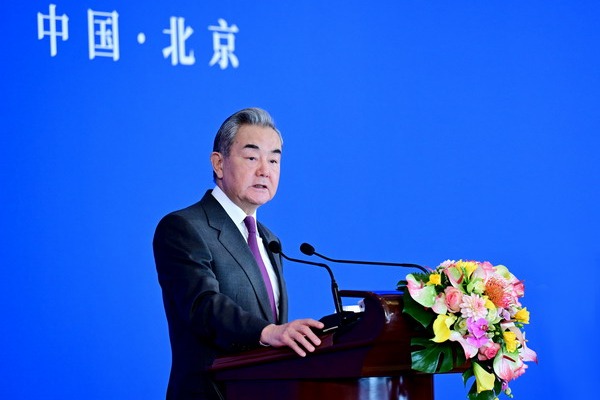Spat to impact stability in Northeast Asia

Standoff with Seoul reflects Tokyo's attitude to trade and historical issues
South Korea and Japan are at a boiling point, as the two neighbors trade accusations and sanctions related to unresolved issues left over from the World War II.
Experts said the spat will impact the stability of Northeast Asia and bring more uncertainties to global economic development.
The standoff between the Asian neighbors arose from the decision of a South Korean court to allow victims of forced labor in the wartime era to sue Japanese companies for compensation. Tokyo says that all such claims were settled in a 1965 treaty between the two countries. Seoul believes that a victim's individual right to file a claim has not expired.
Earlier this month, Japan announced restrictions on exports to South Korea of three chemicals compounds essential to the country's vast semiconductor industry.
Adding to the export curbs, Japan is also preparing to remove South Korea from "trading white list" status, which means exports entail minimum trade restrictions, Japanese media have reported.
The move would hit South Korea's pillar manufacturing industry very hard. Even worse, analysts voiced worry that Japan may take a turn toward trade protectionism, despite the world's third-largest economy portraying itself as a champion of a rules-based international trade order.
Although Japan has not explicitly said the forced labor issue prompted its trade restrictions, by slapping export restrictions on high-tech items critical to South Korean manufacturing, the Japanese government is clearly showing that this it has taken the economic approach to achieve a political end, said Lyu Yaodong, a researcher at the Institute of Japanese Studies of the Chinese Academy of Social Sciences.
Japan and South Korea have a similar industrial mix and compete each other in a wide range of sectors - from steel to autos, from LED displays to digital devices. By leveraging the colonial-era issues to impose tariff barriers on South Korea's core industries, Japan is bringing its political will to economic competition, Lyu said.
"The labor issue is merely an excuse for Japan to use trade sanctions to retaliate against its competitor. This not only reflects Japanese government's protectionist attitude toward trade, but also its revisionist attitude toward historical issues," he added.
Shi Yongming, a senior Asian Pacific researcher, said maintaining a "white list" in trade itself is against the principles of free trade, proving the fragility of the theories of "free trade" Japan has been advocating.
"The Japanese government can decide who's on the 'white list' and who's on the 'black list' at its will, which is not in line with trade liberalism," Shi added.
If the trade conflict between Tokyo and Seoul continues to escalate, the South Korean chipmakers could see a "disruption" in their supply, Rhyu Sang-young, a professor of political economy at Yonsei University in Seoul, told South Korea's Yonhap News Agency.
In the short term, the uncertainty surrounding the supply of computer chips will push their prices up. "What's worse, it will be negative for the global IT industry, as South Korea semiconductor makers account for about 70 percent of global memory market share," Rhyu added.
Broken industrial chain
Yuzo Tanaka, a professor of economics at Ryukoku University in Kyoto, said Tokyo's move will "result in a broken industrial chain that will force individual countries to pursue self-sufficiency".
Yuka Fukunaga, a social science professor at Waseda University in Tokyo, also said: "It is regrettable that Japan, a country which should be critical of US' using trade measures to force policy change in other countries, did the same thing (like the United States)."
South Korea is looking for ways to hit back. President Moon Jae-in said earlier this month that he hopes for a diplomatic solution to the problem, but is prepared to take countermeasures if Tokyo forces his hand.
Some analysts warned that the confrontations may damage the Northeast Asian region's stability and development.
Zhou Yongsheng, a professor and deputy director of Japanese Studies Center at China Foreign Affairs University, said deterioration of relations will have a negative impact on the region.
"Japan seems to follow a precedent set by Washington, as it has used the threat of tariffs to squeeze concessions from its allies and trade partners," Zhou said.
It will deal a blow to the regional economy and stability by hindering the progress of the China-Japan-ROK free trade agreement, especially when Seoul is mulling taking countermeasures against Tokyo, which could worsen the situation, and the US is not expected to sincerely mediate between its two allies, Zhou added.

































